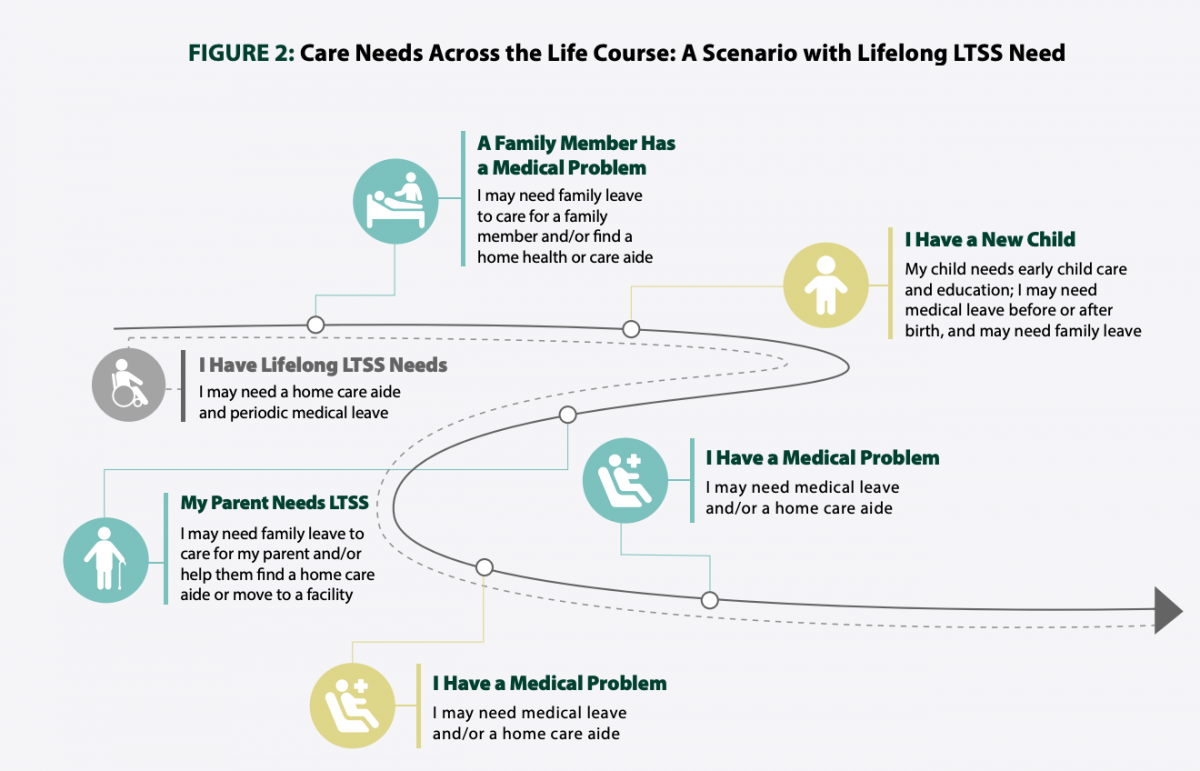Bethany Cole, Research Assistant for Health Policy
The COVID-19 pandemic has highlighted both severe inadequacy and major inequalities in our country’s caregiving infrastructure. Prior to the pandemic, needs for child care, as well as long-term services and supports (LTSS) for older adults and adults living with disabilities, were already growing.
For many families, care demands may become unmanageable, or manageable only at significant cost to family members’ health, well-being, income, and careers. This is especially true for women — especially women of color — who face stark disadvantages in terms of financial security and labor force attachment when meaningful access to affordable early child care and education (ECCE), and to paid family and medical leave (PFML), are lacking.
Vice President Joe Biden has announced a $775 billion investment in the nation’s care infrastructure over the next decade. In the area of ECCE, his proposal includes: establishing a national pre-K program for 3 and 4 year olds; creating a child care tax credit for low-and middle-income families; and partnering with states to provide sliding-scale child care subsidies.
In terms of the needs of care workers, Biden’s proposal includes: increased pay for caregivers and child care workers as well as health benefits, career training, and the ability to unionize; and a $5,000 tax credit for unpaid caregivers, including Social Security credits.
In the area of LTSS, the proposal includes: eliminating the waiting list for home and community care under Medicaid; and establishing an innovation fund for states and organizations to explore alternatives to institutional care.
Last year, in partnership with Caring Across Generations, the Academy released a report, Designing Universal Family Care: State-Based Social Insurance Programs for Early Child Care and Education, Paid Family and Medical Leave, and Long-Term Services and Supports, analyzing options for policymakers, especially at the state level, seeking to address needs in each of these three areas. Uniquely, the report also explores how an integrated approach to care policy might be designed—one offering families a single point of access ECCE, PFML, and LTSS—under an umbrella program called Universal Family Care.
Child care, paid leave, and long-term services and supports are typically siloed in public debate and social policy. In reality, families often simultaneously experience a variety of care needs. For instance, a parent may be coping with their own medical needs while also caring for a child or aging family member with long-term care needs.

An integrated, holistic approach to family care needs over the lifespan merits consideration. Such an approach could also address the needs of care workers, who are disproportionately women and people of color, work in one of the lowest paying (yet fastest growing) sectors of our economy, and who face distinct family care challenges of their own.
Investments in our care infrastructure will help millions of families. Building on the momentum generated by our national experience with the pandemic, the Academy is continuing to work with Caring Across Generations to host a series of state-focused forums to support policymakers’ efforts to address caregiving needs. Links to recordings from forums in Oregon and California in 2019, and more recently, in Minnesota may be found here. Another forum will be held on efforts in California, and forums for Michigan and Illinois will be held in early fall.
For more information about the Academy’s Caregiving work, please contact Bethany Cole, Research Assistant for Health Policy, at bcole@nasi.org.
Additional Resources
Fact Sheet: Paid Leave Provisions in Recent Federal COVID-19 Response Legislation
Issue Brief: Paid Family and Medical Leave Programs: State Pathways and Design Options
Report: Report to the New Leadership and the American People on Social Insurance and Inequality: Caregiving

